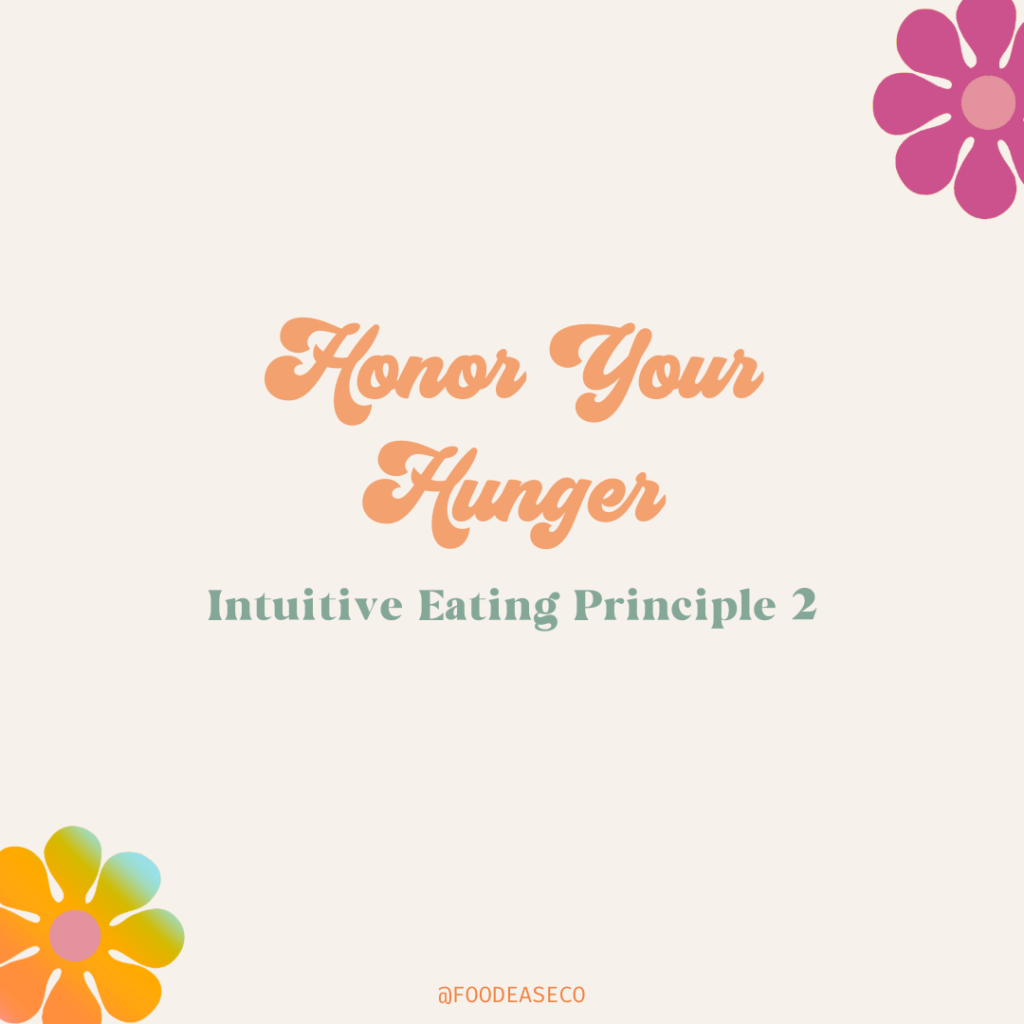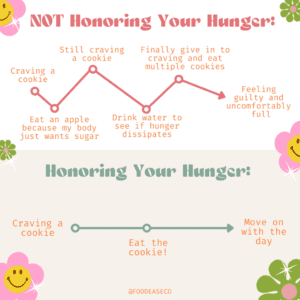Intuitive Eating Principle 2: Honor Your Hunger

Intro
First, let me start by saying that you deserve to eat. Yes, that means every single day no matter what or how much you ate last night.
Diet culture and other experiences can disconnect us from our internal signals to the point that we create a relationship of distrust between our brains and bodies.

Your body deserves to be fed adequately and functions best when done so.
The more we ignore our hunger, the more we reinforce this distrust relationship. If we ignore our hunger cues for too long, we no longer get those hunger cues.
Think of your hunger cues as a friend. If our friend comes knocking (texting/calling/whatever) and we ignore them, after awhile, that friend isn’t going to come around anymore.
We have to slowly nurture the relationship back to life. With our friend and our body.
Why We Lose Touch With Hunger Cues:
· Numbing. We’ve avoided hunger pains over the years by turning to calorie-free beverages such as diet soda or coffee.
· Dieting. We are so used to denying our hunger it starts becoming easing to tune out.
· Stress. The biological stress response can cause disruptions in hunger feelings.
· Basic needs aren’t being met. If you aren’t getting enough sleep or down time, it can disrupt your connection to your body.
· Trauma. You experienced something that made it feel unsafe to eat.
Sometimes it’s difficult to honor hunger and satiety after chronic dieting. Think of other bodily cues that you wouldn’t shame yourself for:
· Feeling sleepy after not getting enough sleep the night before.
· Going to the bathroom because you need to pee.
Why is hunger any different?
Many diets treat hunger as a problem. YOUR PROBLEM. But, really, it’s a sign of LIFE. Let’s work on honoring our hunger without judgment.
Tips to getting back in touch with hunger:
1. Observe how hunger feels to you. Where in your body do you feel hungry? Does it change as your hunger increases?
2. Notice your hunger. Does it change before, during, or after a meal? Were the sensations pleasant? Do you want to experience them again?
3. Notice hunger changing when you fall out of your regular routine. Are you more hungry when you’re tired or anxious? Do you eat less when you have a big event coming up?
When we practice responding to our hunger, even at the most subtle cues, each bite helps heal from the trauma of deprivation.
It shows your body it’s safe and you can start to relax around food.

Use the Hunger/Fullness Scale to check in before and after snacks and meals. With some practice, you’ll be able to eat amounts of food that are intuitively satisfying. Click the image for more details on using this scale.
Distinguishing between thoughts and actual body cues when it comes to hunger can be confusing.
Check out the new “Mind, Body Cue or Self-Care” resource on my website to work through thoughts that may interfere with getting back in touch with your hunger cues.
Remember, this can be a tricky principle to tackle and one you may come back to often.
The intuitive eating journey is not always a linear one. Working with an anti-diet dietitian like myself could help you work though the nuances of honoring hunger.
Here’s to honoring ALL hunger,
Emily
Have a Question?


Do you have any questions or suggestions? Feel free to contact us! Just leave your email here, and we will get back to you shortly.